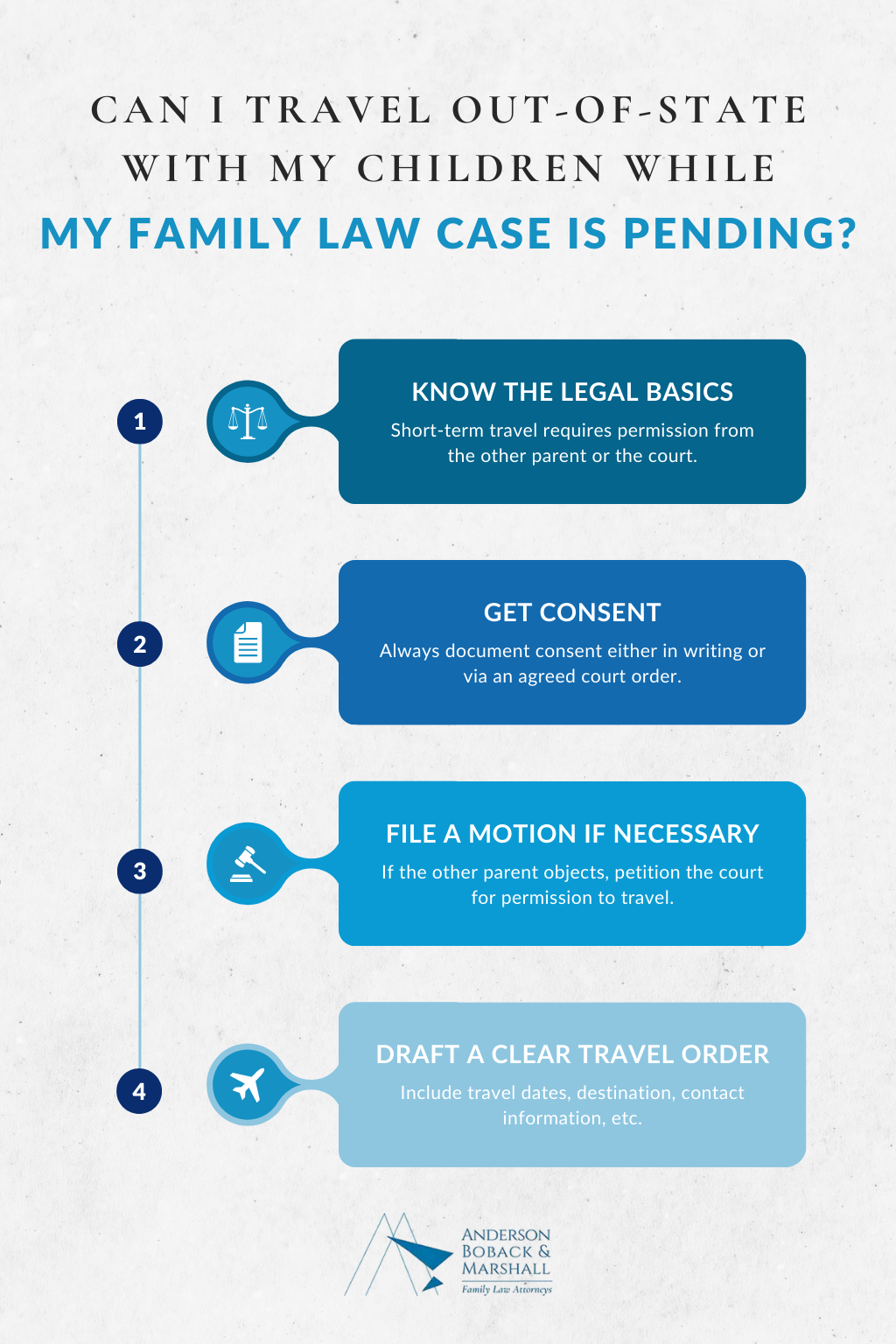Planning a trip with your child, whether it’s a family visit, a weekend getaway, or a school break can feel like a normal part of parenting. But if you’re going through a divorce or custody case in Illinois, even short-term travel can raise legal red flags. Many parents are surprised to learn that crossing state lines with their child may require permission from the other parent or even a court order.
At Anderson Boback & Marshall, we regularly help concerned parents navigate travel issues before they become legal battles. If you’re unsure whether you can travel out of state with your child, this guide will walk you through what Illinois law says, when you need permission, and how to protect your parenting time and peace of mind.
In this post, we’ll explain what Illinois law says about traveling with children during a pending case, and how to protect your parenting time and peace of mind.
1. The Emotional Stakes and Legal Basics
Divorce or custody proceedings already bring emotional upheaval. Planning a family trip or suddenly needing to travel adds another layer of stress. While short-term travel may feel harmless, Illinois courts retain full jurisdiction during pending family law cases. Without clear permission or agreement, such plans can spiral into accusations of parental kidnapping or contempt.
2. Travel vs. Relocation: What Illinois Law Actually Says
Illinois law draws a key distinction between short-term travel and relocation under the Illinois Marriage and Dissolution of Marriage Act (IMDMA).
A relocation is defined as:
- Moving more than 25 miles from your child’s primary residence if you’re in Cook, DuPage, Kane, Lake, McHenry, or Will Counties,
- More than 50 miles if you’re outside those counties,
- Or moving out of state over 25 miles from the current home.
Even short-term trips may require court oversight depending on custody arrangements and co-parent consent.
3. When You Need Consent or Even a Court Order for Travel
3.1 Joint Parenting Time or Parental Responsibilities
If you share parenting time or decision-making responsibilities, you must obtain consent from the other parent before traveling out of Illinois. Verbal agreements aren’t enough always document permission in writing or via an agreed court order.
3.2 No Consent? File a Motion
If the other parent doesn’t agree, you must petition the court. A judge will evaluate travel requests based on the best interests of the child, including details about the trip and the parents’ compliance history.
4. Key Elements of a Clear, Agreed Travel Order
If both parents agree, draft an order that includes:
- Travel dates and duration
- Destination, lodging, and transportation details
- Name of the person accompanying the child
- Emergency contacts and communication plan
- Return date and method of contact while away
Need help drafting a clear, enforceable travel agreement? Contact Anderson Boback & Marshall today.
5. Travel During School Breaks or Holidays
Longer trips during summer vacation, holiday breaks, or school holidays add complexity. Courts appreciate pre-planned agreements aligned with the school calendar to avoid disruptions or disputes down the line. Early negotiation here can prevent post-decree litigation.
6. Emergencies or Last-Minute Travel: What Are Your Options?
Sudden events like family emergencies may necessitate quick decisions. In such cases, you can petition the court for temporary or emergency relief. However, even in emergencies, don’t rely solely on verbal permissions or informal messaging. Legal counsel can guide you through the process to stay compliant while addressing urgent needs.
7. Post-Decree: When the Final Order Is Already in Place
After a divorce or custody decree, travel issues can still arise:
- Want to update or expand scheduled travel? You may need a modification of the parenting plan.
- If your co-parent violates existing travel provisions, you have enforcement options, including contempt proceedings.
Clear agreements and legal support help preserve peace of mind and reduce conflict.
8. Tips for Avoiding Travel-Related Custody Conflict
- Keep all expectations in writing, use email or parenting apps.
- Plan ahead, especially for school breaks or major holidays.
- Avoid using travel as leverage in wider disputes.
- Always prioritize the child’s routine and wellbeing during negotiations.
9. How Anderson Boback & Marshall Supports Parents With Travel and Custody Concerns
At Anderson Boback & Marshall, our experience in Cook, DuPage, Lake, and Will counties ensures we:
- Draft safe, enforceable agreed travel orders
- File urgent motions when time-sensitive travel is needed
- Negotiate pre-decree or post-decree modifications aligned with your child’s best interests
Ready to plan travel that respects your rights and your children’s needs? Schedule a consultation with Anderson Boback & Marshall today.
10. Frequently Asked Questions (FAQ)
Can I travel out of state with my child if there’s no custody agreement yet?
No, without a court order or co-parent agreement, you’re risking potential legal consequences.
Will the court deny travel during a pending divorce?
Possibly but if travel is reasonable, safe, and documented, courts often allow it in the child’s best interest.
What if my co-parent takes our child out of state without telling me?
You can petition for enforcement or modification even file contempt if necessary.
Can I get emergency permission for travel if there’s no time for formal court filings?
Yes, with legal help, courts can offer expedited or emergency relief in urgent scenarios.
What if we’re still married but separated?
The process is similar, always using written agreements or court orders for out-of-state travel.
Conclusion: Make Every Trip Lawful and Peaceful
While travel during family law proceedings is often well-intentioned, legal safeguards are essential. Verbal permissions aren’t enough, always get written agreements or a court order. It protects your parental rights and your children.
Your children deserve stability and you deserve peace of mind. Let Anderson Boback & Marshall guide you through traveling confidently and legally. Schedule your consultation today.
















